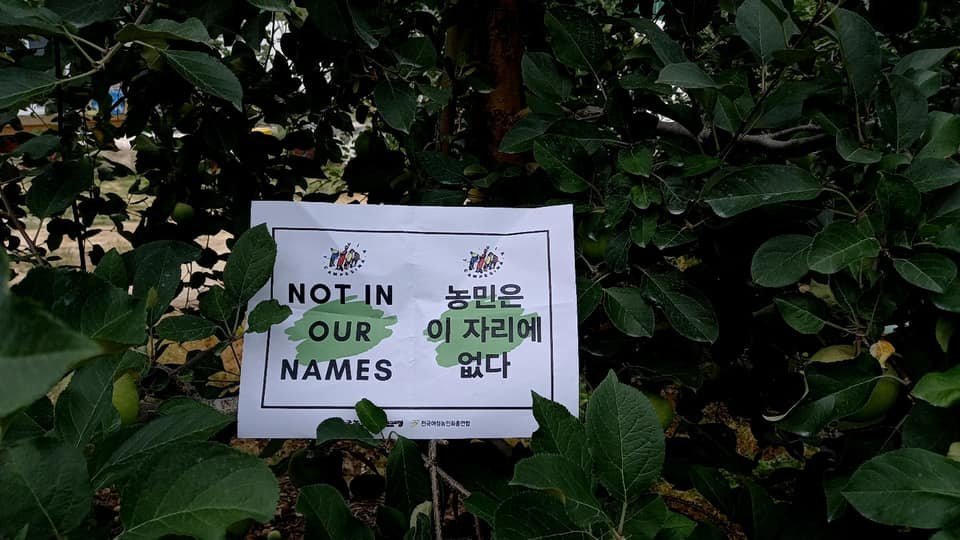Boycott the UN Food Systems Summit 2021. Transform the Food Systems based on Food Sovereignty: La Via Campesina South East and East Asia

Much of the world continues to reel under the COVID-19 Pandemic. Over 190 million people are infected, and over 4 million deaths have been recorded, with 150,000 deaths being reported in the Southeast and East Asia regions. Indonesia, Thailand and Cambodia are struggling to contain a second and more devastating wave.
The crisis goes beyond health. Pandemic related restrictions have put a fork in the gear of rural and urban economies around the world. Vaccine unavailability is hurting rural and urban workers and creating hurdles in economic revivals. The rural areas and people living in the countryside are struggling to find a livelihood.
Pandemic related restrictions, which also makes vaccine certificates mandatory for travel, have crippled local trade and peasant markets in many countries. Economic uncertainty, loss of jobs among workers and slump in rural demand have severely affected the income stability of peasants and small-scale food producers. A drop in the price of rice has added to the woes of peasants in Thailand, while increasing food prices in the Philippines challenges the food security of the working class in the country. In Japan, peasant and indigenous communities are worried that the Tokyo Olympics will lead to another wave, further aggravating the agrarian crisis. The story is not too different in Indonesia and Timor Leste; local peasant markets remain a challenge. In Vietnam and Malaysian, pandemic related restrictions have created a livelihood crisis for migrant urban workers as well as peasant farmers. The impact on women, both within the household and on the farms are particularly severe.
Notwithstanding all this, hunger is on the rise. The State of Food Security and Nutrition in the World (SOFI) 2021 estimated nearly 810 million people on the brink of starvation and malnutrition. In the Southeast and East Asia region, the number of undernourished people is estimated at 48 million. The global food system, which places great emphasis on the people’s food security, has failed in stepping up to the challenge. In contrast, despite all the challenges of a lockdown, local peasant-based productions continue to produce and feed most parts of the world.
The single-handed focus on addressing food security without strengthening local food production is failing. To recall, at the 1996 World Food Summit, La Via Campesina presented Food Sovereignty as the pathway to a resilient, self-sufficient food system. Food Sovereignty goes beyond the limited scope of food security – and recognizes peoples right to healthy and nutritious food produced using agroecological methods and using locally available resources. It is not just about growing food but also about who produces it, how it is produced, and who has access to the means of production. It places great emphasis on setting democratic principles of distribution and consumption. It is an idea that globalizes solidarity while localizing agriculture – based on the tradition and wisdom accumulated from nearly 10,000 years of agricultural production. Food Sovereignty prioritizes and guarantees healthy nutritional food that is climatically and culturally suitable to a region. It preserves local biodiversity that ensures protection to all life forms. If anything, the COVID 19 pandemic has revealed to the world that local communities that function, produce and consume around the principles of Food Sovereignty are the most resilient in the face of a crisis.
Yet, ironically during a pandemic year, the United Nations disregards this idea and invites the Agribusiness Corporations and their sympathizers to construct a Food Systems Summit – with the aim of re-imagining our global food system! The World Economic Forum and its affiliates control the Summit’s design, structure, processes, governance and content. Someone who presided over the Alliance for a Green Revolution in Africa (AGRA) – which failed the peasants and small-scale food producers in Africa – is the Special Envoy of the Summit. The ‘Scientific Group’ in the UN Food Systems Summit comprises corporate-sponsored actors who legitimize corporate-owned knowledge and technology systems, and hold peasant agroecological practices in contempt.
A group of people and transnational corporations, who failed the world in a moment of crisis, are given the mandate to develop a solution and redefine the future of agriculture! How ironic is that?
All the while, 5 billion peasants, indigenous and rural people, whose diverse production systems feed 70% of the world, are kept aside?
This neglect is why, we the small-scale food producers, peasants, fishers, pastoralists and migrant workers of South East and East Asia, organized under La Via Campesina, are boycotting this Summit.
We will not fall for the manipulative tricks of transnational agribusinesses. They have created a Summit to cover up their ineffectiveness and their criminal inability to feed the world despite profiteering billions from the global food system.
Boycott the UN Food Systems Summit! Not in Our Names!
No Future without Food Sovereignty!
For more information; lvc.seea.korea@gmail.com
